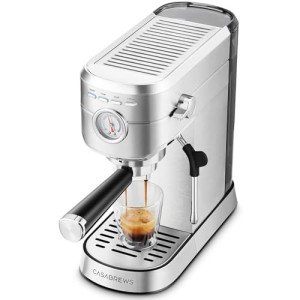Home Use Espresso Machines: A Comprehensive Guide
Espresso machines have actually become a staple in numerous households as coffee enthusiasts seek to reproduce café-quality brews in the comfort of their kitchens. The increase in appeal has caused a varied market filled with numerous designs, functions, and costs. This post aims to supply a useful summary of home use espresso machines, helping readers navigate their options efficiently.
Understanding Espresso Machines
Espresso machines work by requiring hot water through finely-ground coffee under high pressure, resulting in a concentrated coffee drink referred to as espresso. There are a number of kinds of espresso machines categorized based upon their developing techniques and level of automation. The most typical types consist of:
- Manual Espresso Machines: These require the user to control the pressure and water circulation, permitting for a more hands-on coffee-making experience.
- Semi-Automatic Espresso Machines: These provide automatic control over water pressure, while the user manually grinds and tamps the coffee.
- Automatic Espresso Machines: With the push of a button, these machines immediately manage the flow of water, making it simpler to brew espresso with consistent results.
- Super-Automatic Espresso Machines: These all-in-one machines deal with grinding, tampering, brewing, and even milk frothing, making them ideal for users looking for benefit.
- Pill or Pod Machines: These use pre-packaged coffee pods to develop espresso with very little effort, however they limit choice in brewing methods and flavors.
Table: Comparison of Espresso Machine Types
| Type | Control Level | Relieve of Use | Cleaning up Level | Perfect For |
|---|---|---|---|---|
| Manual | User-controlled | Moderate | High | Coffee perfectionists |
| Semi-Automatic | Partial automation | Moderate | Moderate | Home baristas |
| Automatic | Fully automated | Easy | Low | Busy individuals |
| Super-Automatic | Totally automated | Extremely easy | Really low | Convenience hunters |
| Capsule/Pod | Totally automated | Extremely simple | Really low | Casual drinkers |
Key Features to Consider
When picking a home use espresso machine, it's vital to think about different functions that can considerably impact the quality of espresso and user experience.
- Pressure: Look for machines that offer a minimum of 9 bars of pressure, as this is thought about optimum for developing espresso.
- Boiler Systems: Single vs. dual boiler systems determine temperature stability and the capability to brew espresso and steam milk at the same time.
- Grinder: Integrated mills permit freshly ground coffee, which enhances taste. Think about machines with adjustable grind settings.
- Milk Frother: For those who take pleasure in cappuccinos and lattes, an integrated steam wand or automatic frother is crucial.
- Size and Design: Consider your kitchen area space and aesthetic choices. Portable Espresso Machines are available in various sizes, from compact to large setups.
- Price: Home espresso machines can vary from a few hundred to several thousand dollars, so it's essential to develop a budget before checking out alternatives.
Pros and Cons of Home Use Espresso Machines
| Pros | Cons |
|---|---|
| Convenience of brewing coffee at home | Initial investment can be high |
| Quality of espresso is often exceptional | Needs some skill, specifically with manual machines |
| Ability to explore flavors | Upkeep and cleansing can be labor-intensive |
| Can conserve cash in the long run | Not all machines will match every coffee preference |
Upkeep and Cleaning Tips
Keeping an espresso machine is important for lengthening its life and ensuring constant brew quality. Here are some beneficial tips:
- Regular Descaling: Minerals from water can build up in the machine. Descale every 1-3 months, depending on water firmness.
- Daily Cleaning: Rinse portafilters, baskets, and steam wands after each use to avoid coffee oils from developing residue.
- Use Filtered Water: This can help in reducing mineral accumulation and improve the taste of coffee.
- Replace Gaskets and Seals: These elements may break with time and must be replaced to maintain pressure and performance.
- Read the Manual: Each machine has particular care directions; following these will guarantee longevity.
Frequently Asked Questions About Home Use Espresso Machines
Q1: What is the best budget espresso machine?The best budget espresso machine typically depends upon private requirements, however models like the DeLonghi EC155 or the Breville Bambino are popular among users for providing great value. Q2: How long do home espresso machines typically last?With correct maintenance, home espresso machines can last anywhere from 5 to 15 years, depending on the quality of the machine and frequency of use. Compact Espresso Machines : Can I make coffees and lattes with any espresso machine?While most espresso machines can make coffees and lattes, having a trusted
steam wand or frother is vital for achieving the right milk texture.
Q4: Are super-automatic machines worth the investment?For those who focus on benefit and fast brewing, super-automatic machines can be worth the financial investment, though they might do not have some customizability in brew strength and flavor. Q5: What types of coffee beans are best for espresso?While individual choice plays a role, beans identified as" espresso "blends are usually roasted darker, creating abundant tastes and a creamy texture when brewed.
Investing in a home espresso machine can change the everyday coffee regimen into something unique, raising home brews to café quality. By understanding the different types of machines, crucial functions to consider, upkeep needs, and weighing the
advantages and disadvantages, consumers can make informed choices that fit their individual preferences. As the espresso culture continues to grow, no matter the choice, every brew can be a tasty experience waiting to be appreciated.

